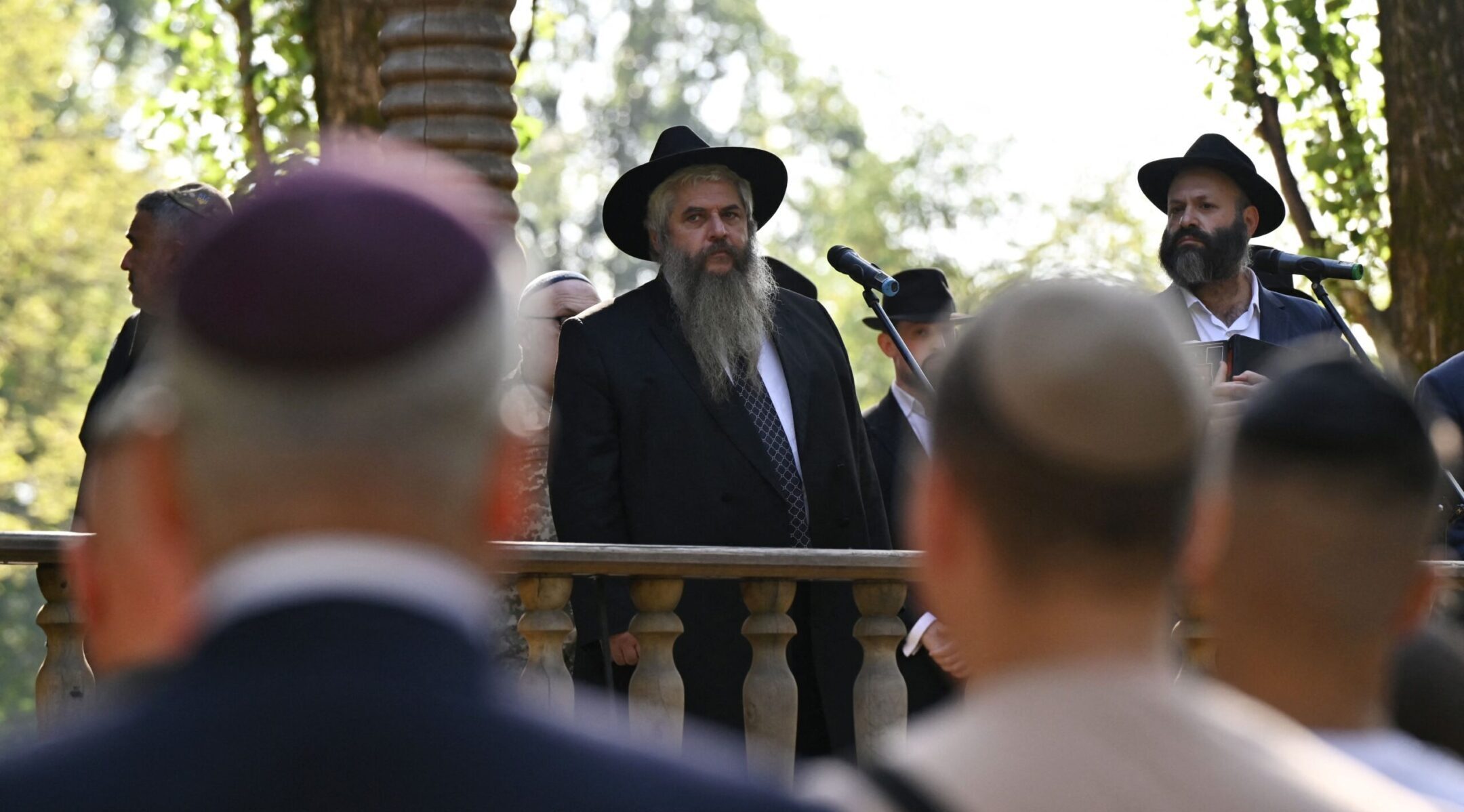Son of leading Ukrainian rabbi is killed in battle against Russia
Rabbi Moshe Azman revealed his son was missing in August

Rabbi Moshe Reuven Azman, a chief rabbi of Ukraine, speaks during the memorial ceremony marking the 82nd anniversary of the Babyn Yar massacre in Kyiv, Sept. 29, 2023. (Genya Savilov / AFP via Getty Images)
(JTA) — A prominent Ukrainian rabbi has announced that his adopted son has been confirmed dead in battle against Russian forces.
Anton Samborskyi will be buried in Kyiv’s Jewish cemetery on Thursday, Rabbi Moshe Azman announced on Wednesday. Azman and his wife adopted Samborskyi at age 11 after the boy was orphaned, Azman said in a post on X last month when he revealed that Samborskyi had gone missing just weeks after being drafted into the Ukrainian army.
Azman is the rabbi of Kyiv’s Brodsky Synagogue and one of multiple men claiming title to chief rabbi of Ukraine. Since Russia invaded Ukraine in February 2022, he has been a vigorous advocate for the Ukrainian cause, castigating the Russians on social media and posting about his efforts to distribute humanitarian aid and military supplies. He had earlier created a rural village to accommodate Jewish refugees during a previous Russian invasion, called Anatevka after the fictional shtetl in “Fiddler on the Roof.”
Samborskyi — to whom Azman and his wife gave the Hebrew name Matisyahu, in honor of the ancient Jewish priest and military leader — had lived with the family for a decade before moving out, marrying and having a child, according to Azman’s post. It was shortly after Samborskyi’s daughter was born in May that he was drafted, Azman said — reflecting a broader mobilization of troops amid a grueling war that is widely seen as effectively a stalemate.
Today is the Day of Remembrance of the Fallen Defenders of Ukraine. Since the beginning of this terrible war, trouble has knocked on the door of almost every Ukrainian – some have lost a loved one, others are fighting with injuries
On this day, I want to share with you my… pic.twitter.com/i195XcwVLo
— Chief Rabbi Of Ukraine Moshe Azman (@RabbiUkraine) August 29, 2024
Exactly how many Ukrainian soldiers have died in battle over the last two and a half years is unclear. The Ukrainian government has not published an ongoing tally but said in February, at the war’s two-year mark, that more than 30,000 troops had been killed. The United States has said it believes the numbers are significantly higher.
Whatever the true tally, the Ukrainian army appears to be strapped for manpower and has intensified efforts to recruit new soldiers, including by lowering the draft age and mobilizing men quickly, sometimes off the streets.
This summer, multiple people associated with Jewish communities in Ukraine said activities had grown more circumscribed because of the threat of being drafted that men face while out and about. In Dnipro, a heart of the Chabad-Lubavitch Hasidic movement, an involved resident told the Jewish Telegraphic Agency last month that men of fighting age were staying home rather than joining in prayer services. And at Ramah Yachad, a Jewish summer camp in western Ukraine, fewer fathers traveled to drop their children off or pick them up, and fewer men were on staff this year.
“Since the beginning of this terrible war, trouble has knocked on the door of almost every Ukrainian — some have lost a loved one, others are fighting with injuries,” Azman tweeted in August, on the occasion of Ukraine’s Memorial Day, when he revealed that Samborskyi was missing. “On this day, I want to share with you my personal pain.”
Two weeks later, he was announcing a memorial service to be held at the synagogue where he has worked since 1995.
Tomorrow in the Central Synagogue there will be a farewell to my son Matityagi (Anton), who died at the front defending Ukraine pic.twitter.com/b93bNAxPxj
— Chief Rabbi Of Ukraine Moshe Azman (@RabbiUkraine) September 11, 2024














